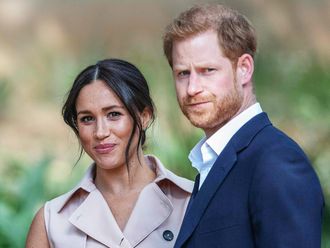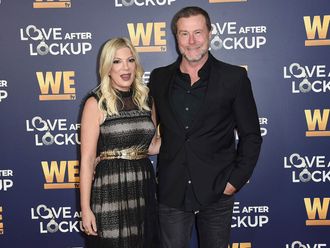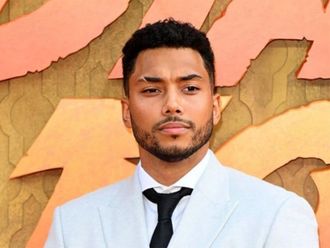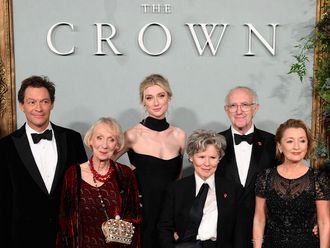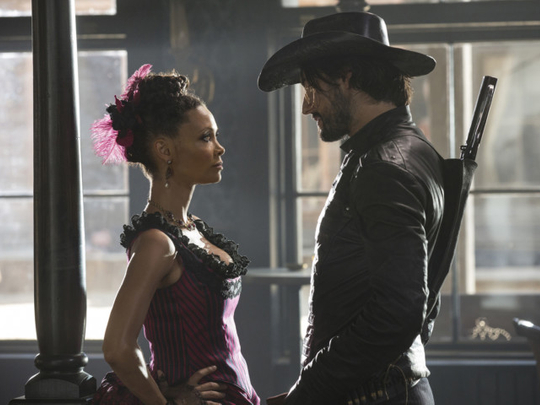
In HBO’s Westworld, Dr Robert Ford (Anthony Hopkins) runs a theme park where wealthy “guests” live out frontier fantasies among lifelike robot “hosts.” In the fourth episode, a colleague points out to him what viewers will have already noticed: Those fantasies almost uniformly involve murder, rape or torture.
It’s true, Ford admits. In the beginning, he says, when the park’s creators wrote its first interactive narratives, “We made 100 hopeful storylines. Of course, almost no one took us up on them.”
Ford sounds like he could be a cable network head of drama development. In the Wild West of Peak TV, channels have supplied, and audiences have rewarded, gruesome serials like Game of Thrones and The Walking Dead that share a worldview that life is horrific and people are terrible.
Westworld, which begins Sunday in the US (early Monday morning in the UAE), is another animatronic body atop that bloody pile, but it’s also a self-aware one. It’s an ambitious, if not entirely coherent, sci-fi shoot-’em-up that questions nihilistic entertainment impulses while indulging them.
Life, for the park’s synthetic hosts, is brutish and long. They interact with guests, have sex with them, are murdered by them — they are equipped with realistic and copious blood — then get repaired, have their memories wiped and go back into service.
Things start going wrong, as they must, when some hosts go haywire after a software update. The head programmer, Bernard Lowe (Jeffrey Wright), finds a cause: They’re beginning to remember fragments of their hellish past lives.
The bug, however, is also a feature. Ford has programmed these “reveries” to make the robots more emotionally nuanced and convincing — more human. In this future, mankind has cured all disease and thus stopped evolution; only robots have a chance to improve. Theresa Cullen (Sidse Babett Knudsen), a quality-control executive for Westworld’s corporate owner, suggests that the company is interested in the AI technology for more than entertainment.
Within the park, a confusing tangle of stories plays out. A gunslinger (James Marsden) arrives with a train load of guests seeking adventure. Among the hosts populating the town are Dolores Abernathy (Evan Rachel Wood), a wide-eyed rancher’s daughter; Maeve Millay (Thandie Newton), a cynical brothel madam; and a rogue’s gallery of outlaws. On the outskirts of all this, the Man in Black (a rattlesnake-creepy Ed Harris) is journeying deep into the park on a violent mission to find its secrets.
Provocative
Especially in the first two episodes, Westworld often plays like a parody of dark cable dramas, with its bad hombres, victimised women and subtle-as-a-six-shooter dialogue like, “You can’t play God without being acquainted with the devil.” Watching it can be like playing a cornily written, gender-stereotyped virtual-reality game.
Then again, that’s exactly what the park is, and that meta aspect becomes provocative, if not completely mitigating. The park is full of caliches, after all, because that’s what the guests demand, and they feel as distanced from the hosts’ suffering as television viewers can be from on-screen butchery. The hosts, they figure, aren’t people, they’re characters.
But does that absolve the guests (and by extension, us)? The show’s moral horror at the marriage of technology and entertainment sometimes recalls a less sardonic version of Black Mirror.
The human heart in Westworld is not in its humans but in its robots. Wood gives a transfixing, layered performance as Dolores, awakening to the existential suspicion that there is a larger reality outside her own.
She and the other hosts are like mortals in Greek myth, subject to the whims of supernatural beings who watch them from above and visit their plane for cruel amusement. The pilot opens and closes with the imagery of flies, recalling Shakespeare: “As flies to wanton boys are we to the gods; they kill us for their sport.”
Temporary death
The series is visually lush, but its most striking effects rely not on CGI but on simple acting. When hosts are shut down, they freeze so fluidly and silently that it takes a moment to notice. The result is less like seeing a machine turn off than watching a temporary death.
The drama among the flesh-and-blood employees in the park’s headquarters, on the other hand, is as sterile as a robotics cleanroom. And the main guest storyline is trite, involving a slimy “black hat” guest (Ben Barnes) goading his goody two-shoes future brother-in-law (Jimmi Simpson) to indulge his wild side.
Westworld was created by Jonathan Nolan and Lisa Joy, with the 1973 Michael Crichton movie as a starting point. Like some of Nolan’s past work (Memento,
Interstellar, Person of Interest), it’s strongest as an intellectual exercise, but it runs chilly. (J.J. Abrams is an executive producer, but the show misses his usual touches of heart and humour.)
What keeps Westworld interesting in its early going, despite its flat patches and flights of pretentiousness, is its willingness to think big. Is there a difference between simulated and actual consciousness? Are we pushing our entertainments to be brutal, or are those entertainments pushing us to be? In the end, Westworld asks the same question of us that it asks about Ford’s creations: Are we nothing more than creatures of our programming?
Don’t miss it
Westworld airs in the UAE on OSN Play and OSN On Demand the same minute as the US on October 3 at 3am. It will also be shown on OSN First HD — Home of HBO at 9pm UAE the same day.



